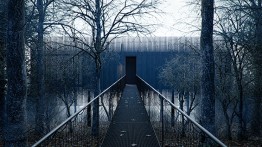Visiting Lecture | William O'Brien Jr.: Room for Artifacts
Thursday, April 6, 2017, 2 - 2pm

Mask House, Visualization, Courtesy of WOJR
William O’Brien Jr. founded WOJR Organization for Architecture in Cambridge, Massachusetts in 2009. O'Brien is an Associate Professor in the Department of Architecture at MIT and a Founder of the collaborative design practice, Collective–LOK. He was a recipient of the Rome Prize Fellowship in Architecture awarded by the American Academy in Rome. He is a MacDowell Fellow and an Aspen Institute Socrates Fellow. He was winner of the Architectural League of New York Prize for Young Architects and Designers. O’Brien studied architecture at the Harvard Graduate School of Design where he was a recipient of the Faculty Design Award. His background prior to architecture is in fine art and music theory. He will be presenting ideas from his book, Room for Artifacts.
Room for Artifacts contains a collection of sixteen architectural artifacts designed by WOJR—a mask, a church, a labyrinth, a dwelling, a bust, and a series of totems, among others. The artifacts are presented three times throughout the book—in conceptual drawings, architectural drawings, and images. Certain characteristics recur, such as symmetry, frontality, figurality, proportionality, and the play between flatness and depth, underscoring WOJR’s preoccupation with the fundamental aspects of architectural form that are rich in historical precedent. Room for Artifacts offers a new way to explore the role of architectural representation in a contemporary context, looking at how architects can invoke aspects of ideologies from architects of the past while establishing a progressive agenda for a forward-looking body of work.
Book signing will take place following the lecture in the 3rd Floor Lobby.
This event is open to current Cooper Union students, faculty, and staff.
Located at 7 East 7th Street, between Third and Fourth Avenues





